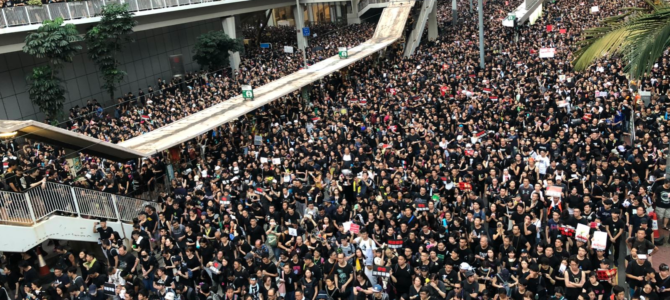
Sunday, Hong Kongers delivered Beijing another powerful blow, not by force or violence, but by exercising their rights at the ballot box.
More than 3 million Hong Kongers, a historical record high, cast votes in last weekend’s local district elections. After the 2015 election, all district councils were under the control of pro-Beijing candidates. This time, the pro-democracy side gained a majority in at least 17 of the 18 district councils, taking 347 seats, while the pro-Beijing camp took only 60 seats, and the remaining 45 went to independent candidates.
Early reports show young, pro-democracy candidates, many of whom were protesting against the government just days ago, overwhelmingly won their elections. These candidates received wide support from the public, winning “in poor and rich neighborhoods, in both protest-prone and non-protest-afflicted districts and, in downtown areas as well as the suburbs.”
District council elections in the past haven’t received much attention, and voter turnout is usually low because elected council members have only the authority to handle neighborhood issues such as trash collection. They do not have any legislative power and are not part of the LegCo, Hong Kong’s 1,200-member legislative body that can pass laws and “elect” Hong Kong’s chief.
This year’s election, however, has gained outsize political importance because it has been considered one of the few nonviolent options for Hong Kongers to have a referendum on their government, to express their dissatisfaction with the Hong Kong authorities and to exercise their rights.
How Hong Kong Protests Influenced the Election
Leading up to the election, we saw images and images of the once-serene campus of Hong Kong Polytechnic University become a fire-lit war zone. Police in full riot gear fired tear gas, rubber bullets, and sometimes even live ammunition against overwhelmed protesters, who fought back with only bricks and bows and arrows. Many protesters are teens or in their early 20s. Police sealed all campus exits, trapping the protesters in despite pleas from parents and volunteers to let the young people go.
Since June, Hong Kong police have arrested more that 5,000 protesters and have been widely condemned for their brutal tactics.
Hong Kong has been quiet the past two days. Protesters wisely took extraordinary steps to ensure the election would go smoothly without interruption. One of the pro-Beijing councilwomen, Chow Ping-tim, who lost her seat, told a reporter from the South China Morning Post that her loss had nothing to do with her record, but she was paying a political price because “the administration’s governance has given rise to so many public grievances.” The person who defeated her, Lester Shum, an active participant in the last six months’ pro-democracy protest, said in response, “The government must respond to our five demands as soon as possible. We can be happy for tonight and take a rest tomorrow, but we will need to keep up our fight the day after for the future of Hong Kong.”
For months, Beijing has insisted that Hong Kong protesters are nothing but a small group of “rioters” who like to cause trouble and have no public support. The resounding victory of pro-democracy candidates discredits Beijing’s claim. It’s a great humiliation for Hong Kong Chief Carrie Lam and especially for Chinese leader Xi Jinping. Hong Kongers just showed him they have something much more powerful than tanks, live ammunition, tear gas, and soldiers.
Carrie Lam Should Compromise
The question everyone is asking after the pro-democracy movement’s landslide victory at the ballot box is: now what? The sensible option is for Lam to meet with representatives of the pro-democracy movement and compromise on their five demands:
- Withdraw the extradition bill (which she has belatedly done)
- Establish an independent inquiry into police conduct
- Stop characterizing protesters as rioters
- Release arrested protesters
- Lam resign and grant Hong Kongers universal suffrage
As we have seen, however, Lam isn’t about being sensible. She recently repeated that she wouldn’t consider protesters’ demands. After delivering such a humiliating defeat for Beijing, Lam’s job is on the line. Beijing may have to replace her in order to save face.
Will Xi Jinping Double Down?
China’s leader Xi also has a choice to make. Anthony Cheung, former secretary of transport and housing, suggested, “Sensible Beijing officials should have a good grasp of public sentiment in Hong Kong after the election results.” He recommended Beijing adjust its policies in the wake of the election result and at least appoint an independent commission to investigate police brutality, as a start.
However, I doubt Xi will be this sensible. Internal party factions are already complaining about his trade war with the U.S. and his inability to get the Hong Kong unrest under control. The latest Hong Kong election defeat may embolden someone inside the Communist Party to question his leadership. Xi may choose to deepen Hong Kong’s political crisis by refusing to allow Hong Kong authorities to compromise. He may take such a hard-line approach in order to suppress any internal opposition.
No matter what Lam and Xi decide to do today and the days ahead, in the battle between freedom and tyranny, freedom won this round — thanks to freedom-loving Hong Kongers.









